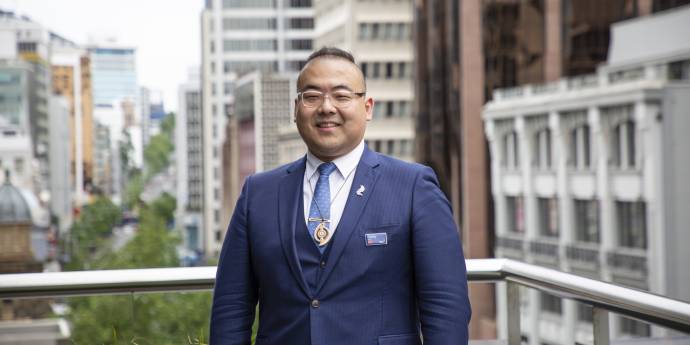What I’m Reading – Jess Kumar
Emerging director Jess Kumar MInstD shares how reading helps her build perspective, ask better questions and lead with confidence.
Auckland-based Franky Wang CMInstD has successfully merged his interests and expertise through his board roles, which span finance, sport, start-ups and NFPs. He sits on the boards of Kāhui Tū Kaha, the IoD’s Auckland Branch Committee, New Zealand Asian Leaders, and the Basketball Development Trust.
As the Head of Asia Business for the Bank of New Zealand, he manages the development and execution of its Asia Strategy, and his commitment and passion for diversity and inclusion led him to found BNZ’s diversity and inclusion council.
This week, Franky shares an unexpected read that brings focus and purpose into the spotlight.

What is the name of the governance/ business book you’re reading or can recommend? Think Like a Monk: Train Your Mind for Peace and Purpose Every Day, by Jay Shetty.
How would you describe the style of writing?
Succinct, direct, meaningful and purposeful.
Jay Shetty is always curious with his pathway to success as a result of calculated risk. Throughout his very successful journey, he has been able to bring his personal experience into real-life examples for millions of us who are always struggling with focus and clarity. His book provides insights to ‘stay on your course’ without being distracted by the fast-changing world.
What drew you to the book?
Many years ago, I went through a period that was uncertain, meaningless, and where I felt demotivated. This book was introduced to me by a mentor of mine who I met through attending IoD events, and I am forever grateful for the book. It reminds me of the purpose of life and, as a result, I have been able to find inner peace. This is part of an important skillset and one that requires us to train our minds because it isn’t something we are born with.
Reflecting on my governance journey, this ‘purpose’ is exactly why we are expected to set the future direction. As a director on any given board, we are there to provide a sense of clarity with a strong vision, bringing everyone together towards the organisation’s goal.
What resonated with you the most?
The ego is an obstacle to growth – knowing the difference between ego and self-esteem is crucial. No one has all the answers and having the mind-set to learn from anyone who brings us together as a team is a real skill that is so effective when we are on a board.
We often walk into the room hoping to know everything with a strong confidence, but having humility allows you to see your own strengths and weaknesses clearly so you can work, learn and grow your confidence in the boardroom.
What is something you’ve taken away from reading that now follows you into your board roles?
Gratitude is good for everyone at the board table, and feeling blessed with a strong sense of fulfilment. We don’t often see each other outside of the boardroom, and it is important for a group of people who don’t meet on a regular basis to feel connected, appreciated and thrilled to be making a difference for our community as a collective.
How does reading feed into your continued governance practice learning?
Governance is all about ongoing learning and reflective practice. Reading helps us to mitigate risks, resonate with successes and failures, build confidence in specific sector expertise, which eventually leads us all to better decision making based on knowledge, experience and framework.
Who should read this book and at what stage in their governance career?
This is a book for anyone at any stage of their governance journey, including those who do not aspire to a governance career but have regular interaction with the board in a senior leadership role. Having a purpose every day helps us to focus and stay on track through a balanced path to success.
When you’re not reading books on business or governance, what kind of books are you likely to pick up?
I have just started reading Elon Musk by Walter Isaacson. I’m hoping to discover why he never gives up and whether his resilience has been built from his upbringing, life events, business failures, or all of the above.
What are some of the most pertinent governance issues at the top of mind for you currently, and why?
Climate change and sustainability are the first ones because they create ongoing challenges on Earth. The latter creates solutions to the challenges that have been imposed – we have all borrowed this planet from our future generations and we better keep it safe and sustainable.
What has been the most surprising thing you’ve discovered about yourself and others while being on a board?
I always ask for more information and a detailed analysis, hoping to make the best-informed decision within a timeframe. However, we don’t always have adequate information provided to us due to time. The ability to make decisions based on what we have access to at the time, means we have to live with the consequences associated with this, as it’s the best we can do. Governance is not for everyone. Fortunately, it has been incredibly fulfilling for me to observe, learn and grow with many governance leaders that I have come across from the IoD network. The ability to learn, adapt and reflect are essential skills to remain effective as a director on any board.
If there was anything you want to see more of at the board table, what would it be, and why?
I would like to see more diverse thinking in the boardroom that supports ethnic diversity with a strong social and business-growth mind-set, through good governance. This matters because boards make decisions based on our planet, people and prosperity.